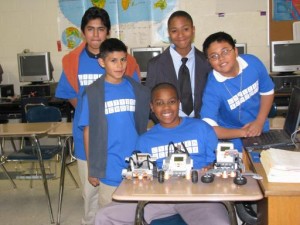Citizen Schools gives students real world job experience
By Russ Campbell, Special to WRAL Tech Wire STEM NewsResearch Triangle Park, N.C. — Citizen Schools helps extend the learning day.
Operating Monday through Thursday after normal school hours, the national non-profit based in Boston, Mass. provides a second shift of educators to support students with academic support, homework completion, and opportunities to connect with community professionals through hands-on projects called apprenticeships.
 Citizen Schools serves 11-to 14-year-old students at no cost to students and their families. These middle schoolers voluntarily participate in this program and sign up at the beginning of each school year.
Citizen Schools serves 11-to 14-year-old students at no cost to students and their families. These middle schoolers voluntarily participate in this program and sign up at the beginning of each school year.
Since its founding in 1995, Citizen Schools has branched out in seven states at 37 schools, four are in North Carolina – Eastway and Martin Luther King Jr. middle schools in Charlotte, Henderson Middle School, and Lowe’s Grove Middle school in Durham. Next year, Citizen Schools will launch Extended Learning Time (ELT) – serving all sixth graders at Neal Middle School in Durham.
This ELT campus will focus on science, technology, engineering and math (STEM) education and is looking to partner with businesses in RTP to lead apprenticeships. WRAL Tech Wire spoke with Cassie McIntyre, manager of civic engagement for Citizen Schools, about their efforts in STEM education.
Tell us more about your apprenticeships?
Our apprenticeships are hands-on, 10-week projects that pair community professionals with middle schoolers. Students work side-by-side with caring adults for 90 minutes a week focusing on 21st century skills such as oral communication, data analysis, technology, and leadership.
Apprenticeship topics are chosen by each volunteer and previous topics have included Mock Trial, Invest Like a Millionaire, Cooking and Robotics. Fidelity Investments is a national funder and partner of Citizen Schools. They lead four different apprenticeships at Lowe’s Grove Middle School. Number Crunchers makes math fun for students by offering them real-world scenarios to problem solve.
What kind of apprenticeships focus on STEM?
STEM has been a major focus for Citizen Schools for the past three years or so. Last summer we received funding by the National Science Foundation to expand our work on STEM apprenticeships.
In Durham, students had the opportunity to work with electrical engineers from EMC. Throughout the semester students learned about engineer concepts, programming, and how to build circuits. Student and volunteer teams designed and constructed projects like energy and sound meters. These products were presented to Lowe’s Grove Middle School as part of their presentation at the end of the semester. We’re also working on partnering N.C. State students with our middle-school students to work on Web design and other applications. At Lowes Grove this spring, we will have a robotics program where students will work with engineers and other volunteers to build robots. They’re learning how to work in teams and develop the communications skills to present what they’ve learned.
In North Carolina, Citizen Schools has partnered with STEM companies like General Dynamics and Microsoft. General Dynamics engineers teamed up with our students to

build and program robots for the first time this year. In addition to building robots, students learn the importance of working with a team and sharpening their communication skills. In Charlotte, a large team of Microsoft volunteers are teaching students about computers. This year our students have seen some of Microsoft’s newest technologies before anyone else.
What sparked the decision to focus on STEM careers?
There’s a need for more hands-on STEM education. There are more and more STEM jobs available, but the local workforce does not have the skills and education to fulfill those roles. They don’t have the 21st Century skills in technology and data analytic skills; and, as a result, many jobs are outsourced to other countries. We started focusing on STEM so our students could be exposed to STEM careers and develop the skills they’ll need to go into a STEM field.
What’s on the horizon?
We’re looking at expanding our robotics program, as well as our Web design programs. In Research Triangle Park, we’re partnering with Biogen Idec for a career day for students to shadow professionals and have an opportunity to see the labs.
How can businesses get involved?
We have a volunteer section on our Web site for a wide range of commitment levels, giving lectures, reviewing resumes, or leading an apprenticeship. Less than 6 percent of high school seniors are considering a career in engineering, and that’s down 36 percent from a decade ago. That’s why we’re focusing on STEM. We want to create a pipeline of future employees. It’s rewarding to see the light bulb moments when students who may not be doing so well academically start getting the hand-on experience and really become engaged.
